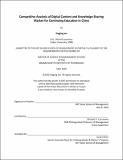| dc.contributor.advisor | Michael A. Cusumano. | en_US |
| dc.contributor.author | Jun, Jingjing,S.M.Sloan School of Management. | en_US |
| dc.contributor.other | Sloan School of Management. | en_US |
| dc.coverage.spatial | a-cc--- | en_US |
| dc.date.accessioned | 2020-09-03T17:46:25Z | |
| dc.date.available | 2020-09-03T17:46:25Z | |
| dc.date.copyright | 2020 | en_US |
| dc.date.issued | 2020 | en_US |
| dc.identifier.uri | https://hdl.handle.net/1721.1/127089 | |
| dc.description | Thesis: S.M. in Management Studies, Massachusetts Institute of Technology, Sloan School of Management, May, 2020 | en_US |
| dc.description | Cataloged from the official PDF of thesis. | en_US |
| dc.description | Includes bibliographical references (pages 31-32). | en_US |
| dc.description.abstract | The digital content market for continuing education in China became an industry of popularity in the mid-2010s. Companies in this industry provide content products curated to the need of customers who would like to better use fragmented time for self-improvement. This market was boosted by the rising population of the middle class, the high mobile payment penetration, the growing popularity of content KOLs on social media, and by strengthened IPR protection. Audio content has been the most popular form of products in this niche market. The audio content market for continuing education is dominated by top market players. Platform thinking framework will be introduced to evaluate and compare business models of top market players. The network effect is strong at some level, but top IP rights owners can still change the power dynamics between content suppliers and platforms. Customers tend to multi-home, i.e. participating on multiple platforms providing similar services, because of diverse content tastes and the convenience of switching platforms. Niche market players can still exploit the market due to high differentiation opportunities. With the entire content market growth for continuing education beginning to slow down aftermarket hype, companies sought ways of diversification to drive revenue. Lastly, the growing popularity of smart speakers, "hearables", and smart car systems is expected to bring a new growth driver to the audio content market in the future. | en_US |
| dc.description.statementofresponsibility | by Jingjing Jun. | en_US |
| dc.format.extent | 32 pages | en_US |
| dc.language.iso | eng | en_US |
| dc.publisher | Massachusetts Institute of Technology | en_US |
| dc.rights | MIT theses may be protected by copyright. Please reuse MIT thesis content according to the MIT Libraries Permissions Policy, which is available through the URL provided. | en_US |
| dc.rights.uri | http://dspace.mit.edu/handle/1721.1/7582 | en_US |
| dc.subject | Sloan School of Management. | en_US |
| dc.title | Competitive analysis of digital content and knowledge sharing market for continuing education in China | en_US |
| dc.type | Thesis | en_US |
| dc.description.degree | S.M. in Management Studies | en_US |
| dc.contributor.department | Sloan School of Management | en_US |
| dc.identifier.oclc | 1191824267 | en_US |
| dc.description.collection | S.M.inManagementStudies Massachusetts Institute of Technology, Sloan School of Management | en_US |
| dspace.imported | 2020-09-03T17:46:25Z | en_US |
| mit.thesis.degree | Master | en_US |
| mit.thesis.department | Sloan | en_US |
